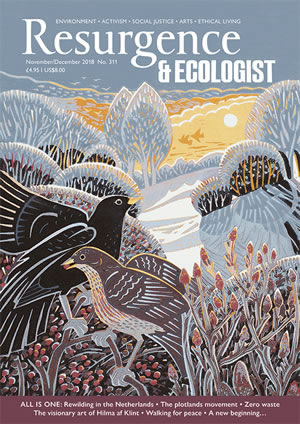Like deciduous trees, I enter a dormant phase in the autumn and struggle to get motivated in the grey, grainy mornings. But I find comfort in the fact that much of the life around me is also in this state, whether encased in cocoons, curled up in log piles or seeking warmth in some other snug place. We may be different life forms, but we are part of the same systems. It is this sense of unity that we celebrate in the following pages.
The world began with unity and only later became fractured into polarities – so believed Swedish painter Hilma af Klint, whose powerful abstract work we explore in our Arts section. The story of how we all began is also the subject for Keynotes, in which Michael Barrett considers the dichotomy of human and Nature as interpreted through the book of Genesis, and how, in the age of the anthropocene, we need to step away from the notion of “mastery” of the rest of the living planet and instead emphasise our connectivity.
In Ethical Living, Sue Kittow describes how the solitary act of walking nurtures a sense of unity, and in Undercurrents Andrew Papworth and Tim Fisher share a way of addressing family conflict inspired by Maori culture, which aims to give every person involved a voice.
Just as united we stand, divided we fall: this is the message at the heart of our Ecologist interview, where senior climate consultant Suzanne Dhaliwal calls out racism in the environmental movement and calls for the creation of safe spaces to discuss anti-oppression and accountability. We need a model of organising that is a mirror of the world that we are trying to create, she says. “Keep talking about things,” she urges. And keep listening.
Her words make me think of small birds in winter: treecreepers, long-tailed tits, wrens, and more, who flock together to improve their chances of finding food and surviving attacks by predators. I’d like to think that as we prepare ourselves for the weather ahead we can follow their example.







